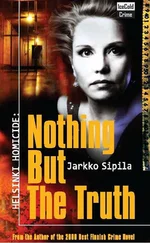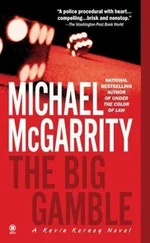Michael McGarrity - Nothing But Trouble
Здесь есть возможность читать онлайн «Michael McGarrity - Nothing But Trouble» весь текст электронной книги совершенно бесплатно (целиком полную версию без сокращений). В некоторых случаях можно слушать аудио, скачать через торрент в формате fb2 и присутствует краткое содержание. Жанр: Триллер, на английском языке. Описание произведения, (предисловие) а так же отзывы посетителей доступны на портале библиотеки ЛибКат.
- Название:Nothing But Trouble
- Автор:
- Жанр:
- Год:неизвестен
- ISBN:нет данных
- Рейтинг книги:4 / 5. Голосов: 1
-
Избранное:Добавить в избранное
- Отзывы:
-
Ваша оценка:
- 80
- 1
- 2
- 3
- 4
- 5
Nothing But Trouble: краткое содержание, описание и аннотация
Предлагаем к чтению аннотацию, описание, краткое содержание или предисловие (зависит от того, что написал сам автор книги «Nothing But Trouble»). Если вы не нашли необходимую информацию о книге — напишите в комментариях, мы постараемся отыскать её.
Nothing But Trouble — читать онлайн бесплатно полную книгу (весь текст) целиком
Ниже представлен текст книги, разбитый по страницам. Система сохранения места последней прочитанной страницы, позволяет с удобством читать онлайн бесплатно книгу «Nothing But Trouble», без необходимости каждый раз заново искать на чём Вы остановились. Поставьте закладку, и сможете в любой момент перейти на страницу, на которой закончили чтение.
Интервал:
Закладка:
Quinn’s stormy expression cleared slightly. “He came to me three months ago asking about the villas. I’d just begun negotiations with an elderly gentleman who wished to sell his property by private treaty at the end of the summer rather than at auction. McGuire paid me a ten-thousand-euro commission in advance to secure the property.”
“How did the money come to you?” Sara asked.
“He gave me a bank draft the very next day, along with written authorization to make an offer above the fixed price if necessary.”
“Go on,” Sara said.
“When the contracts were drawn up by the solicitor, Mr. McGuire returned, signed them, and paid the ten-percent deposit after renegotiating the closing date, which he asked to have put off because Ms. Paquette would be unavailable until a later time. Since it was a cash purchase without the need for a secured mortgage, the seller agreed.”
“How did you keep in contact with McGuire?” Sara asked.
“I have his mobile number.” Quinn stood, took an address book from a desk drawer, and read off the number, which didn’t match with the one Sara had discovered in Paquette’s hotel room.
“Where did he stay while he was here?” Sara asked.
“He stayed on his motor yacht at the marina,” Quinn replied as he watched Fitzmaurice dial his mobile phone. “Who are you calling?”
“A detective to come and take your written statement,” Fitzmaurice replied, “which will then be carefully checked for truthfulness.”
Outside Quinn’s office Sara turned to Fitzmaurice. “Do you think he knew Spalding’s money was dirty?”
“He probably suspected it, at the very least,” Fitzmaurice replied, “as we have every reason to believe that Spalding bribed him to remain silent about certain particulars.”
“Well, the one thing we know for certain is that Paquette agreed to Spalding’s scheme long before she rendezvoused with him in Paris. What do you know about boating and motor yachts?”
“Except for a few nautical terms not a blessed thing,” Fitzmaurice answered.
“Nor do I,” Sara said as they walked toward the car park.
The Dun Laoghaire Marina, situated yards away from the ferry terminal to Wales and the rapid-transit rail station to Dublin, was a modern facility catering to all types of leisure boats, from small sailing dinghies to large yachts.
Sailboats and motorboats filled the marina, masts rising from the decks, sails furled, hulls gently knocking against the crisscross pattern of walkways where the boats were moored. In the bay a small regatta of boats in full sail cut through the waves past an old stone pier with a red-domed lighthouse and headed out to sea. In the distance the Holyhead ferry steamed toward Wales, smoke billowing from the stack.
The ferry terminal adjacent to the marina was a stark contemporary structure with a circular upper story that seemed to have been deliberately designed to look like an airport conning tower. It matched perfectly with the steel-and-glass architecture of the nearby rail-station ticket office that spanned the tracks below.
At the marina office a young man named Bobby Doherty, who had the wind-burned face of a sailor and an anchor tattooed on a forearm, searched through recent berthing records.
“I remember him,” Doherty said, as he flipped through papers. “He has a new Spanish-built Rodman Fifty-six, with twin Volvo engines and three cabins. He berthed here two or three times.”
“A very expensive boat that is, then?” Fitzmaurice asked.
“It cost him half a million euros, if it cost him a penny,” Doherty said.
“And you’re sure this is the man,” Fitzmaurice said, poking his finger at the photograph of George Spalding that he’d placed on the counter.
“Yes, Mr. McGuire,” Doherty said, glancing at the photo. “He tied up on the Q berth, where we put the larger visiting boats.”
“Did he sleep onboard his boat while he stayed here?” Sara asked.
“Of that I can’t be sure,” Doherty said as he handed the records to Fitzmaurice. “One of the night-watch crew could better answer that question.”
Fitzmaurice scanned the papers and passed them to Sara. Spalding had berthed his boat, Sapphire, three times at the marina on dates that corresponded nicely with his recent travels to Ireland, and had paid in cash. They’d missed him by five days.
“Do you know for certain that Mr. McGuire owns the boat?” Sara asked.
Doherty shrugged. “He could have hired it. Many people do that when they come here on holiday.”
“Who could tell us if it was a hired boat?” Fitzmaurice asked.
“Either the Registrars of Shipping or the Irish Sailing Association,” Doherty said. “Both keep excellent records of ownership, and you may want to ask after Mr. McGuire at the National Yacht Club. On his first visit he asked me to direct him there.”
“What time does the night watch start?” Fitzmaurice asked.
“Johnny Scanlan comes on duty at eighteen hundred hours,” Doherty replied.
Fitzmaurice handed Doherty a business card. “Have him stand by for us at that time.”
Doherty nodded. “Have we had a criminal in our midst?”
“It’s a family emergency,” Sara said. “How do we get to the yacht club from here?”
“Easily done,” Doherty said, and he rattled off directions that took them directly toward the lighthouse with the red dome.
Fitzmaurice parked in front of the National Yacht Club. The entrance consisted of a six-panel double door with a semicircular pediment window above. It was enclosed by a wrought-iron fence and a gate bracketed by two tall, ornate light stanchions. In spite of the Georgian touches the building had the look of a low-slung French chateau. Two polished brass plaques on either side of the door announced that it was indeed the National Yacht Club and that the building had historical significance.
After Fitzmaurice showed his credentials at the reception desk, they explored the public rooms while waiting for a club official to come talk to them. In a large gallery comfortable chairs and couches were arranged to give a view of the bay through a series of tall windows. Oil paintings of sailing ships in hand-carved gilded frames adorned the walls. In the separate dining room the tables were set with crystal stemware and silver flatware. The adjacent bar was an inviting, intimate cove of dark paneling and polished mahogany. There were few people about, but as they returned to the front room, a smiling older man with a neatly trimmed gray beard and mustache, and wide-spaced brown eyes below a bald, round head approached, introduced himself as Diarmuid O’Gorman, the commodore of the club, and asked if he could be of assistance.
Fitzmaurice displayed his Garda credentials and showed O’Gorman Spalding’s photograph. “We’re trying to locate a Mr. George McGuire and we understand he may have visited the club early in the summer.”
O’Gorman nodded. “Yes, I spoke with him myself. He was keenly interested in becoming a member. A very pleasant gentleman. Is he in some sort of difficulty?”
“Not at all,” Fitzmaurice said. “A family matter requires his attention.”
“I’m afraid I can’t help you. He left with a membership application and a promise to return after he settled into a house in Dun Laoghaire. He said it might be some time before he would be ready to put himself forward for admission, and that he would be traveling until then.”
“On his motor yacht?” Sara asked.
“Yes, but he’s planning to purchase a racing dinghy, a sport we’re particularly active in. We’ve hosted two world championships in recent years.”
“Did he say where he might be going after he left Dun Laoghaire?” Sara asked.
“He mentioned wanting to complete the yachtmaster ocean training scheme.”
Читать дальшеИнтервал:
Закладка:
Похожие книги на «Nothing But Trouble»
Представляем Вашему вниманию похожие книги на «Nothing But Trouble» списком для выбора. Мы отобрали схожую по названию и смыслу литературу в надежде предоставить читателям больше вариантов отыскать новые, интересные, ещё непрочитанные произведения.
Обсуждение, отзывы о книге «Nothing But Trouble» и просто собственные мнения читателей. Оставьте ваши комментарии, напишите, что Вы думаете о произведении, его смысле или главных героях. Укажите что конкретно понравилось, а что нет, и почему Вы так считаете.












